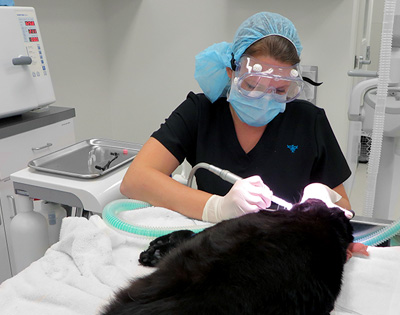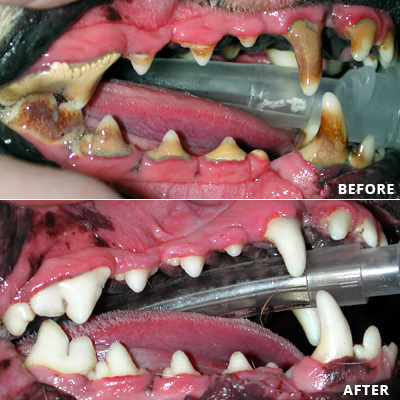The Best Pet Dental Care in the North Charleston Area

February is Pet Dental Month- All Dental Cleanings are 10% off!
You are a responsible pet owner and you take good care of your pet. But do you always remember to take care of their teeth?
Pets have dental diseases and problems just like people do. Dental issues can affect a pet's heart, liver and kidneys as well as their mood. Regular dental check-ups at Sweetgrass Animal Hospital—combined with good dental hygiene at home—can improve your pet's health, vitality and well-being, while helping ensure your pet leads the best life possible.
When we perform a professional veterinary dental cleaning, we look at the whole mouth, not just the cosmetic appearance of teeth. We look at the tissues that support the teeth and the health of the gingiva or gums, and focus on addressing the underlying problems to make your pet more comfortable.
Protecting Your Pet's Dental Health
We believe that the centerpiece of good dental care is a complete oral exam followed by a thorough cleaning designed to remove plaque and slow its buildup.
At the veterinary hospital in Summerville, your pet’s veterinarian can perform:
- Complete dental cleanings with ultrasonic scalers
- Surgical extractions
- Periodontal therapy
- Dental x-rays
- Oral mass removals
Should we find any issues—such as evidence of gum or tooth erosion, gingivitis or excessive plaque buildup—we will discuss this with you and offer treatment options for your pet. We are experienced dental practitioners and are capable of offering a number of dental procedures and oral surgeries.
Signs of Pet Dental Problems

Classic "doggy breath" is not necessarily normal. Halitosis (bad breath) is the most common symptom of periodontal disease—an infection of the gums and potentially the other supporting structures of the teeth—and is sometimes the only warning sign pet owners notice. Plaque builds up every day on the tooth surface including at the gum line. Left in place, the plaque can harden in less than two days, forming calculus or tartar. The continued build-up of tartar—both above and below the gum line—can create an environment where destructive bacteria can flourish, causing damage to periodontal tissue and producing an offensive odor.
Additional signs of dental disease include:
- Red and swollen gums
- Pain or bleeding
- Loose or missing teeth
- A yellowish-brown crust of plaque on the teeth near the gum line
- Decreased appetite or difficulty eating
Pets tend to hide discomfort from dental disease until the problem becomes severe. That is why Dr. Christopher Askins recommends your pet's teeth are consistently examined to catch early problems.
